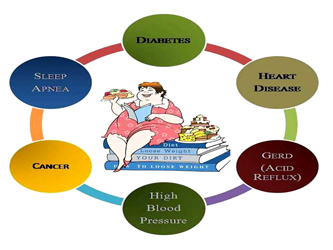Diseases which are associated with obesity
Diseases which are associated with Obesity: They are Chronic in nature

Diseases which are associated with obesity can be very chronic and prevention should be the best medicine for them
When we mention the conditions associated with weight gain people often think of being lazy or just being less concern with the good healthy nutrition. What many are not aware of is that there are several diseases which are associated with obesity and weight gain. In a series of different articles we are going to be discussing some of these chronic health conditions which we can easily put to control if we get the right information. To help us understand the clear picture or the magnitude of the conditions, we are going to be talking to the experts at AWAREmed Health and Wellness Resource Center under Doctor Akoury’s care. Therefore doctor Akoury is going to be responding to some of the concerns that we want to bring to you with a view of changing lives for the better. The following are just but a few of the diseases which are associated with obesity:
- Diabetes mellitus
- Hypertension
- Dyslipidaemia
- Heart disease
- Cerebrovascular disease
- Respiratory disease
- Cancer
- Gynaecological and obstetric complications
- Surgical and anaesthetic complications
- Chronic kidney disease
Diseases which are associated with obesity: Diabetes mellitus
This one such health conditions that is strongly associated with overweight and being obese. The most frustrating point with this condition is that is very difficult to treat and once affected, it can only be managed. Obesity is linked to type 2 diabetes mellitus and this cut across both genders and irrespective of where you’re coming from. And in fact the relationship between obesity and diabetes is such intertwined that the connection has been nick named ‘diabesity’. The flow from obesity to diabetes is due to a progressive defect in insulin emission together with a steady rise in insulin resistance. The fact that insulin resistance and improper emission of insulin are happening very prematurely in obese individuals is worsening towards diabetes. An increase in overall fatness, preferentially of visceral as well as ectopic fat depots, is specifically associated with insulin resistance. The accumulation of intramyocellular lipids may be due to reduced lipid oxidation capacity. Therefore the ability to lose weight is related to the capacity to oxidize fat. Thus, a relative defect in fat oxidation capacity is responsible for energy economy and hampered weight loss.
Diseases which are associated with obesity: Hypertension
The relationship between obesity and hypertension has been investigated in a large number of cross-sectional population studies and a smaller number of prospective, observational studies. The results indicate that in most populations, blood pressure increases linearly with increasing relative body weight or body mass index. The relationship is present across all subgroups, although the magnitude of the association appears greater in whites than blacks and greater in younger than older persons. It is estimated that as much as one-third of all hypertension may be attributable to obesity in populations where hypertension and obesity are widely prevalent. Evidence from prospective studies and clinical trials suggests that hypertension in obese patients increases the risk of cardiovascular disease and that drug treatment of hypertension reduces the risk.
However, it is uncertain whether the risks associated with hypertension and the benefits of treatment are as great in obese hypertensives as they are in lean hypertensives. The effects of weight reduction on blood pressure have been investigated in a small number of randomized, controlled trials involving a total of about 600 participants. Overall, the results of the trials indicate that weight reduction lowers blood pressure over intervals of up to one year. The magnitude of the blood pressure response appears to be directly proportional to the amount of weight loss achieved. However, the latter is inversely related to the length of follow-up. Adequate maintenance of weight loss remains a major problem for the much-needed, long-term trials of the effects of weight reduction on blood pressure and the cardiovascular complications of hypertension.
Diseases which are associated with obesity: Heart disease
Obesity is reaching epidemic levels in most parts of the world but the greatest concern is the trail of destruction this condition is leaving on the complications of the heart. How does this happen? Doctor Akoury explains:
Diseases which are associated with obesity: Obesity Leads to Blockage in the Arteries
Let us start by explaining what insulin is, this is a hormone that helps the body metabolize blood sugar, or glucose. When one is obese the insulin resistance goes up causing the body to be less effective in digesting glucose. The result of this is high blood sugar which facilitates the formation of pre-diabetes or diabetes. As we had said above, this is a serious risk factor for heart disease. And due to the ineffectiveness of insulin operations in the liver, triglycerides (fats) increases in the blood causing the bad cholesterol, or LDL to go up and good cholesterol or HDL to come down.
Remember that cholesterol is a chemical which is very vital to a number of functions in the body. However, too much level of cholesterol in the body can be harmful. LDL transport cholesterol from the liver and intestines to various parts of the body. During this transportation process, if there we have excess cholesterol the excess will build up in the walls of arteries throughout the body, including those in the heart and brain. HDL takes cholesterol from the walls of the arteries and carries it back to the liver and intestines where it can be excreted. When there is too little HDL to carry away the excess LDL, it leads to atherosclerosis, which is hardening and narrowing of the arteries. This is a major risk factor for heart attack and stroke. Just to further on the relationship between obesity and heart diseases, obesity is also associated with increased risks of:
- Coronary artery disease
- Heart failure
- Atrial fibrillation
Diseases which are associated with obesity: Coronary artery disease
Various studies have shown that an increased risk of coronary artery disease (CAD) in the overweight is real and realistic. This is because while studying some 300 000 adults for 7 years, it was established that about 9% increase in ischaemic-heart disease events for each unit change in BMI.46 moreover, obesity was associated with both fatty streaks and raised atherosclerotic lesions in the right coronary and left anterior descending coronary arteries specifically in young men. Nonetheless as for those individuals with pre-existing heart conditions the link between obesity and cardiovascular mortality is not very strong.
Diseases which are associated with obesity: Heart failure
Doctor Akoury explains that the relationship between obesity and heart failure is complex. According to the Framingham Study where some 6000 individuals with no heart failure records in the past but of age 55 were followed keenly for some14 years. Up on concluding the study, it was established that, the risk of developing heart failure was two-fold higher in obese individuals, in comparison with subjects with a normal body-mass index. On multivariate analysis adjusting for risk factors including hypertension, coronary artery disease and left ventricular hypertrophy, there was an excess risk of 5% in men and 7% in women for each 1 point increase in BMI. It was estimated that 11% of the cases of heart failure in men and 14% in women could be attributed to obesity alone. These complications can be very chronic and the sooner you tackle them the better. To help you get lasting solutions of all these, you will need to call doctor Akoury for an appointment to commence treatment.
Diseases which are associated with obesity – They are Chronic in nature




